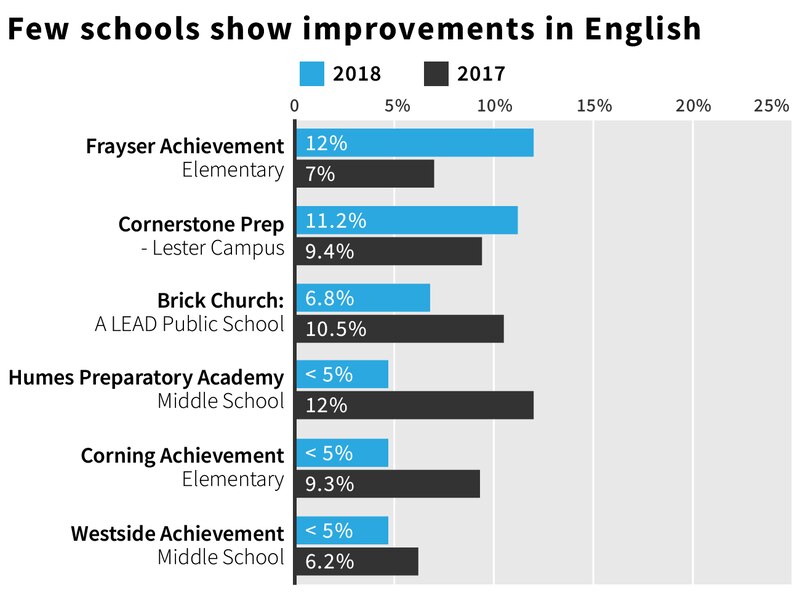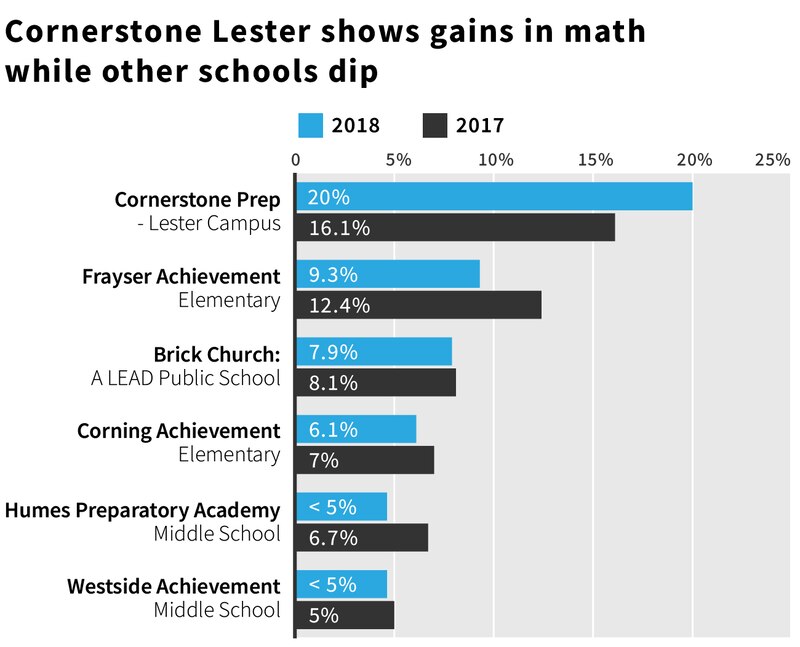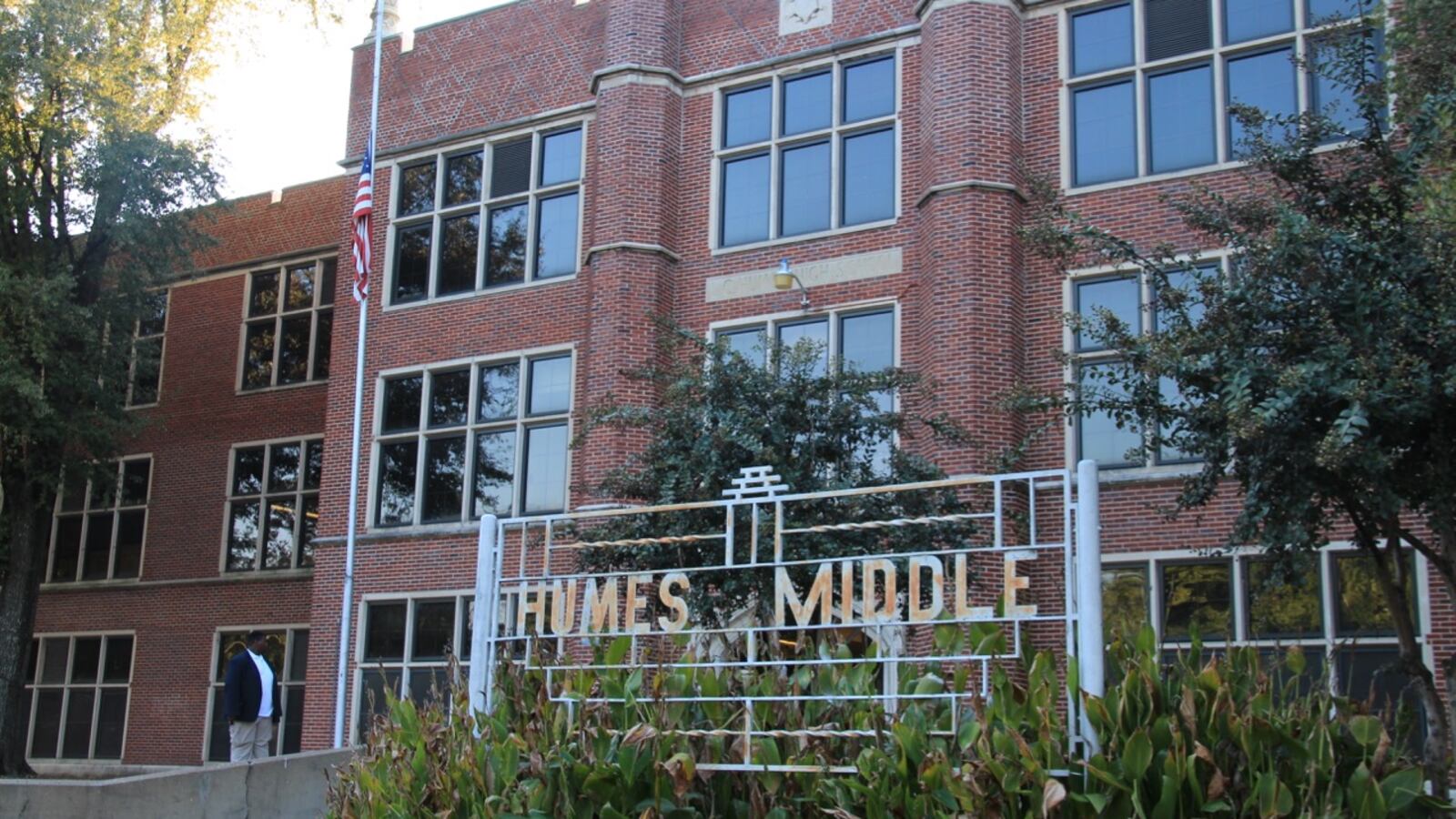Six years after the state took over six of Tennessee’s lowest-performing schools, all of those schools continue to struggle, new state test results show.
The state’s ambitious goal with the Achievement School District was to transform the schools that tested in the bottom 5 percent into top-performers within five years. Though the district’s founder later acknowledged the goal was too lofty, the new test results shed light on the massive challenge ahead for the schools and for Sharon Griffin, who became the district’s new leader in June.
Of the schools in the original state-run district, four of the six had fewer than 10 percent of students testing at or above grade level in math or English during the 2017-2018 academic year, according to TNReady test results released last week. Meanwhile, Cornerstone Prep Lester Elementary School in Memphis performed better than its counterparts with 11.5 percent of students at grade level in English and 20 percent of students at grade level in math. Frayser Achievement Elementary had 12 percent of students at grade level in English, but just 9 percent at grade level in math.
As a point of comparison, statewide averages for grades 3-8 had 33.9 percent of Tennessee students at grade level in English and 37.3 percent at grade level in math.
In taking over these schools back in 2012, the state handed them over to charter organizations. Five were launched in Memphis, and Brick Church College Prep was opened in Nashville. The state-run district now has 30 schools, the majority of which are in Memphis.
Search for any school within the Achievement School District below, including the original six. You can compare 2018 TNReady scores to see the percent of students scoring at/above grade level and growth scores for multiple schools. Note: The state doesn’t release data for an exam if fewer than 5 percent of students were on grade level.
The idea for the state district was originally based on the Recovery School District in Louisiana. But while the New Orleans charter-led district has seen success in boosting academic achievement, the Tennessee district was never set up for the same success, said Douglas Harris, a Tulane Professor of Economics and founder of the Education Research Alliance for New Orleans.
The Achievement School District requires its charter schools to enroll 75 percent of students from the surrounding neighborhoods. The New Orleans recovery district was open enrollment, which drives schools to compete for students, Harris told Chalkbeat. He also noted that the Tennessee state district has yet to close charter schools that aren’t rising to the challenge of transforming underperforming schools.
“If you look at New Orleans, one of the main sources of improvement here was the takeover process,” Harris said. “Some charter operators that were initially brought in were not successful, and so the state turned those schools over to charter operators who were showing success. At least half of the improvement in New Orleans was just driven through that process.”
While four schools in the Tennessee state district have closed due to issues like under-enrollment, the state has not closed or replaced charter operators in the district due to low performance.
Harris said that after six years, the district should be seeing more fruit.
“On one hand, creating an entirely different way of governing schools does take time,” Harris said. “On the other hand, based on what we know so far in New Orleans, the ASD hasn’t been designed to succeed. They are trying to adopt a couple of pieces from New Orleans without the complementary pieces that were important to making system work as a whole.”
Here are the percentages of students scoring on or above grade level in English:

Time for improvement?
Tennessee also ran schools directly, which Harris called a mistake. Whereas most schools in the Achievement School District are run by an outside charter organization, Corning and Frayser elementaries and Westside Middle School in Memphis were initially taken over by a charter organization created by the state. (This fall, however, the state has handed off Westside to a new charter operator in the Achievement School District.)
Notably, two of the three Memphis schools that were directly taken over by the district in 2012 had some of the largest dips in student test results — Corning Achievement Elementary School and Westside Middle School.
Outgoing Gov. Bill Haslam and Education Commissioner Candice McQueen have stood by the state district, even after another year of lackluster results.
On a Wednesday visit to Georgian Hills Elementary, an Achievement district school in Memphis that’s seen some academic success, Haslam said he believes that six years in, the state district is still “growing into itself.”
“The ASD started out of nothing, and took over some of our most difficult schools,” said Haslam, who is term-limited. “We’re growing into that challenge, and I still believe it’s a good thing for the state, for Memphis, and for Shelby County.”
But Haslam also said changes were and are needed — and the biggest way the state is trying to turn the tide is through the new leadership of Sharon Griffin, the former leader of the Innovation Zone, a Shelby County Schools-led initiative to improve low-performing schools in Memphis’ traditional district. The iZone was launched in response to the state district takeovers, but has shown greater initial success at boosting scores.
Here are the percentages of students scoring on or above grade level in math:

Leadership change
Griffin recently hired a new central office team looking to boost the academic performance of all schools within the state district, and particularly the school that the state runs directly. She’s also pledged to improve the district’s relationship with its communities and retain high-quality teachers — two issues that have plagued the district.
Ron Zimmer, a professor of public policy at the University of Kentucky, has authored numerous studies on Tennessee turnaround efforts — including a brief earlier this summer concluding that schools in the state district are doing no better than other low-performing schools that received no state help.
Zimmer told Chalkbeat that an initial look at the recent school-level data backs up the brief’s grim assertion. But he also said he hopes the state gives Griffin a chance to show what she can do.
“She certainly had success in the Innovation Zone, and the ASD hasn’t matched that level of success,” said Zimmer, who has studied Griffin’s iZone efforts. “One of the things she told us while she was at the iZone was that early wins were needed to build momentum early on improving performance. She’s walking into a different situation with the ASD, there are no early wins. It’s a tall task, but she certainly deserves a chance to achieve it.”
But some Memphis residents are saying Griffin’s appointment is too little, too late. Jerry Wilson’s Frayser neighborhood in Memphis is home to nine schools in the state district, three of which are run directly by the state.
“Initially you can say it takes time, but after six or seven years, you can’t say that anymore,” said Wilson, the pastor at Faith Church Methodist Church and former Frayser Neighborhood Council president. “It is what it is. You have to say: This experiment is over and these charter schools aren’t able to manage these schools and shouldn’t be getting any more money from the state to do so. The issue has always been accountability. There isn’t ultimate accountability.”
Wilson said that Griffin has a “proven track record of turning around schools,” but that structural changes need to accompany leadership changes in the district.
Despite lagging state test scores, a bright spot for the original six Achievement School District schools are their growth scores. Student growth is measured in Tennessee on a scale of 1 to 5, with 1 being the lowest measure, through the Tennessee Value-Added Assessment System, known as TVAAS. To calculate the growth score, the state compares a student’s performance to the performance of his or her peers who have performed similarly on past assessments, according to the state.
While the Achievement School District scored in the lowest level of student growth as a district, Corning, Frayser, and Lester elementaries scored a 3, and Brick Church scored a 4.
“Turning around schools is really difficult, especially schools in some of our most challenging neighborhoods,” Haslam said. “The key thing [for the next governor] is to decide what you want to do, get the right leaders in place, and stay the course … I think we have a great leader now who is a product of Memphis schools.”
Note: This is the first time there is year-over-year TNReady data for the Achievement School District. There are no scores for the 2015-2016 school year because tests for middle and elementary schools were cancelled across the state after a series of logistical and technical challenges. And comparing the last two years of TNReady results to state tests prior to 2015 would be like comparing apples and oranges, because Tennessee moved to a new, more rigorous state test in 2015.
Graphics by Sam Park.

